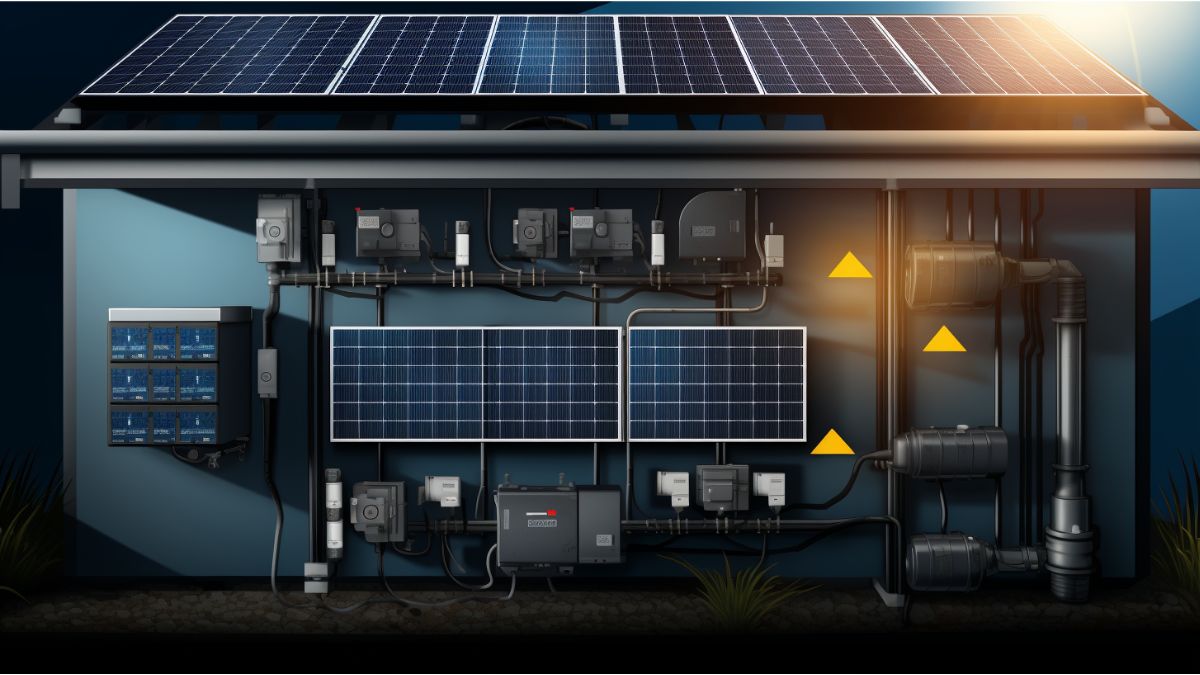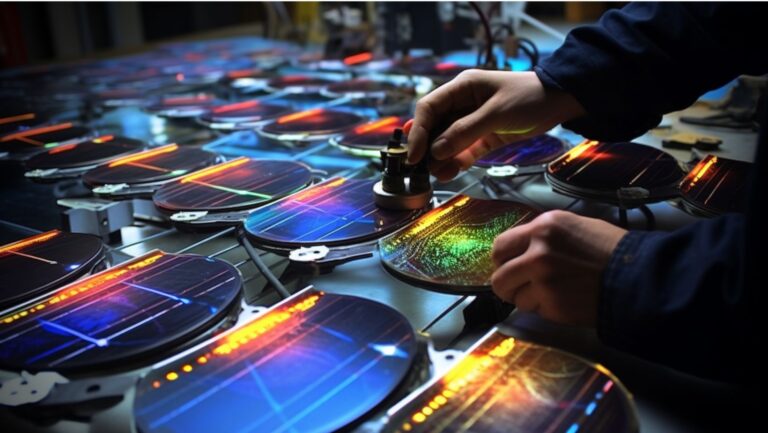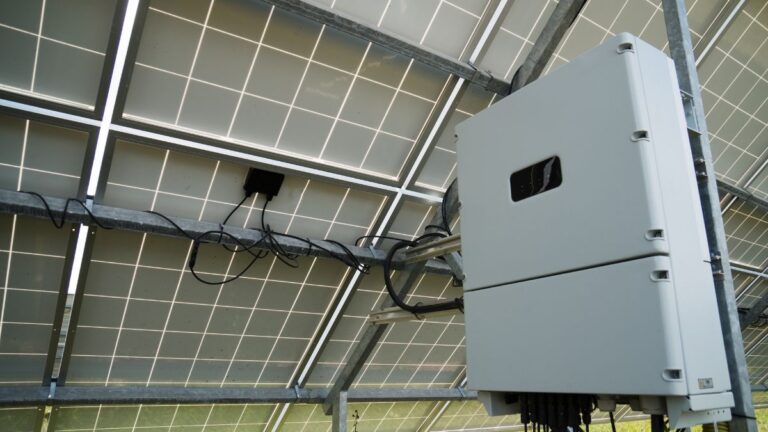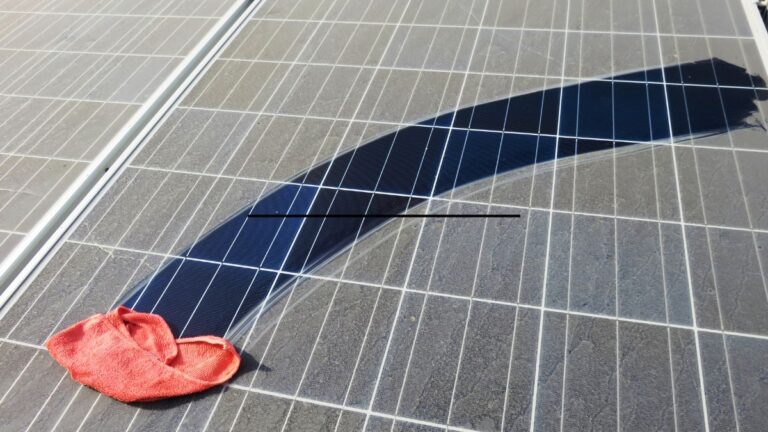AC Vs DC Solar Battery Coupling System: Which Is More Efficient?
Are you curious about which solar battery coupling method is more efficient? Keep reading! We’ll be exploring the world of AC vs. DC solar battery coupling in the next section.
Well, here’s an interesting statistic for you: AC-coupled systems, which convert DC solar electricity into usable AC electricity, have historically been more common. However, DC coupling is gaining popularity due to its higher overall system efficiency.
In this article, we’ll delve into the advantages and disadvantages of both AC and DC coupling, helping you make an informed decision about which option is best for you.
So let’s dive in and explore the world of AC vs. DC solar battery coupling!
Key Takeaways
- AC-coupled systems involve converting DC solar electricity into AC electricity before it can be used, while DC-coupled systems directly store DC electricity from solar panels.
- AC-coupled systems require three inversions of electricity, resulting in small efficiency losses, while DC-coupled systems involve only one inversion, reducing efficiency losses.
- AC-coupled systems are easier to install and have lower upfront costs, while DC-coupled systems are more complicated to install and have higher upfront costs.
- AC-coupled systems are more suitable for retrofit installations, while DC-coupled systems are better for new installations with higher overall efficiency.
Understanding AC and DC Coupling
AC and DC coupling have different advantages and considerations when it comes to solar plus storage systems.
AC-coupled systems involve converting DC solar electricity into AC electricity before it can be used by appliances, while DC-coupled systems directly store DC electricity from solar panels.
In AC-coupled systems, electricity is inverted three times before being stored in the battery, while in DC-coupled systems, it is inverted only once.
AC-coupled systems have been more common historically, but DC coupling is gaining popularity. AC-coupled systems are more suitable for retrofit installations, while DC-coupled systems are better for new installations.
They are easier to install, resulting in lower upfront costs. However, AC coupling requires three inversions of electricity, resulting in small efficiency losses.
On the other hand, DC-coupled systems have higher overall system efficiency compared to AC-coupled systems, as they involve only one inversion of electricity, reducing efficiency losses. However, DC-coupled systems are more complicated to install, leading to higher upfront costs and longer installation time.
It is important to consider the existing solar panel system and the desired efficiency when choosing between AC vs DC solar battery coupling. Assess the impact of installation costs and efficiency on the decision-making process.
Advantages and Disadvantages of AC Coupling
Consider the ease of installation and lower upfront costs when deciding between AC and DC coupling for your solar plus storage system.
AC coupling is easier to install, resulting in lower upfront costs. It allows batteries to charge from both solar panels and the grid, providing resiliency and rate arbitrage benefits. AC coupling is also compatible with utility energy storage programs that require control over the flow of electricity.
However, AC coupling requires three inversions of electricity, resulting in small efficiency losses. Inverters used in AC-coupled systems typically have efficiency losses of a few percentage points.
On the other hand, DC coupling has higher overall system efficiency compared to AC coupling, as it involves only one inversion of electricity, reducing efficiency losses. However, DC coupling is more complicated to install, leading to higher upfront costs and longer installation time. It is suitable for new installations where efficiency is prioritized.
Advantages and Disadvantages of DC Coupling
When deciding between AC and DC coupling, you should take into account the higher overall system efficiency of DC coupling. DC-coupled systems have a distinct advantage in terms of efficiency, as they involve only one inversion of electricity compared to the three inversions required in AC-coupled systems. This reduces efficiency losses and leads to a more efficient overall system.
However, it is important to consider the cost implications and installation complexity associated with DC coupling. DC-coupled systems are generally more complicated to install, resulting in higher upfront costs and longer installation time. Additionally, retrofit limitations may make DC coupling less suitable for existing installations.
On the other hand, DC coupling is an excellent choice for new installations where efficiency is prioritized. Ultimately, the decision between AC vs DC solar battery coupling should consider factors such as installation costs, efficiency requirements, and grid resiliency needs.
Choosing the Right Solar Plus Storage System
To make the right choice for your solar plus storage system, consider the following factors:
- Cost considerations: Evaluate the upfront costs associated with both AC-coupled and DC-coupled systems. AC-coupled systems generally have lower upfront costs due to their simpler installation process.
- Efficiency comparison: Compare the overall system efficiency of AC-coupled and DC-coupled systems. DC-coupled systems have higher efficiency as they involve only one inversion of electricity, reducing efficiency losses.
- Retrofit vs. new installations: Determine whether you have an existing solar panel system or if you’re installing a new system. AC-coupled systems are more suitable for retrofit installations, while DC-coupled systems are better for new installations.
Consider the impact on installation time and the compatibility with utility energy storage programs when making your decision.
AC Vs DC Solar Battery Coupling: Key Factors to Consider
Assess your specific installation needs and desired level of simplicity to determine the best choice between AC and DC coupling for your solar plus storage system.
When considering cost considerations, AC-coupled systems are generally more affordable upfront due to their easier installation process. However, DC-coupled systems offer higher overall system efficiency, making them a better choice for new installations.
Retrofit installations are better suited for AC coupling, as they utilize the existing solar inverter system. Installation complexity is another factor to consider, as AC-coupled systems are simpler to install compared to DC-coupled systems, which require rewiring.
Additionally, if control over the flow of electricity is important to you, AC coupling allows for compatibility with utility energy storage programs.
Ultimately, the decision between AC and DC coupling depends on your specific needs, installation type, and the desired level of efficiency.
Related Post: Best Solar Panel Battery Bank for Home: The Ultimate Guide.
Benefits of AC Coupling
AC-coupled systems are easier to install, resulting in lower upfront costs. Here are the benefits of AC coupling:
- Increased flexibility: AC-coupled systems allow batteries to charge from both solar panels and the grid, providing resiliency and rate arbitrage benefits. This means that you can take advantage of lower utility rates or use stored energy during power outages.
- Compatibility with utility programs: AC-coupled systems are compatible with utility energy storage programs that require control over the flow of electricity. This allows you to participate in programs like demand response or time-of-use rates, maximizing your energy savings.
- Cost savings: AC coupling offers cost savings in terms of installation. Since AC-coupled systems are easier to install, they require less labor and time, resulting in lower upfront costs. This makes AC coupling a more affordable option for retrofit installations.
While AC coupling does have some efficiency losses due to multiple inversions of electricity, the benefits of increased flexibility and cost savings often outweigh these disadvantages.
Benefits of DC Coupling
Now, let’s delve into the benefits of DC coupling for solar battery systems.
DC coupling offers higher overall system efficiency compared to AC coupling. With DC coupling, there is only one inversion of electricity, resulting in reduced efficiency losses. This makes DC-coupled systems a great choice for new installations where efficiency is a priority.
However, it’s important to consider the installation complexity of DC-coupled systems. They are more complicated to install, leading to higher upfront costs and longer installation times. This may make them less suitable for retrofit installations where rewiring is required.
When deciding between AC vs DC solar battery coupling, consider the compatibility of the system. AC-coupled systems are recommended for retrofit installations where a solar inverter system is already in place. On the other hand, DC-coupled systems are a better option for new installations with higher overall efficiency.
It is crucial to perform a cost analysis and evaluate the impact of installation costs and efficiency before making a decision on which solar battery system is best for you.
Installing Solar Plus Storage Systems
Consider the potential cost savings and environmental benefits of installing a solar plus storage system. Here are three key factors to keep in mind when it comes to the installation process, cost considerations, efficiency comparison, retrofit vs. new installations, and the impact on overall system performance:
- Installation process: Installing a solar plus storage system involves several steps, including mounting solar panels, connecting them to the inverter, and integrating the battery storage system. It is important to hire a qualified professional who can handle the complexity of the installation process.
- Cost considerations: The cost of installing a solar plus storage system can vary depending on factors such as the size of the system, the type of batteries used, and any additional equipment needed. It is essential to carefully evaluate the upfront costs and potential long-term savings to determine the financial feasibility of the system.
- Efficiency comparison: When comparing the efficiency of different solar plus storage systems, it is crucial to consider the conversion losses associated with AC and DC coupling. AC-coupled systems may have slightly lower overall efficiency due to multiple inversions of electricity, while DC-coupled systems tend to have higher efficiency with only one inversion. Understanding this efficiency difference can help you make an informed decision based on your specific needs and priorities.
Installing a solar plus storage system can provide numerous benefits, including reduced reliance on the grid, potential cost savings, and a positive environmental impact. Whether you are considering a retrofit installation or starting from scratch with a new system, carefully weighing the installation process, cost considerations, efficiency comparison, and overall system performance will help you make the right choice for your energy needs.
Related Post: A Brief Guide To Installing Solar Power In Your Home.
Financial and Environmental Benefits of Solar Plus Storage
To determine the financial and environmental benefits of solar plus storage, you should assess the potential cost savings and positive impact on the environment.
By integrating solar panels with a storage system, you can maximize the utilization of renewable energy, reduce electricity bills, and decrease your carbon footprint.
The environmental impact of solar plus storage is significant as it allows for the efficient use of clean, renewable energy, reducing reliance on fossil fuels and mitigating greenhouse gas emissions.
In terms of cost effectiveness, solar plus storage systems can provide long term savings by reducing reliance on the grid and avoiding peak demand charges.
Additionally, the storage capacity of these systems enhances grid resiliency, ensuring a stable and reliable power supply during outages.
Overall, evaluating the financial and environmental benefits of solar plus storage is crucial for making an informed decision that aligns with your goals of sustainability and long term savings.
Is Solar Plus Storage Right for You?
Installing a solar plus storage system can help you save costs and reduce your environmental impact. Here are three key points to consider:
- Cost analysis: Before making a decision, it’s essential to conduct a cost analysis. Evaluate the upfront costs of installation, including equipment and labor, and compare them to the potential long-term energy savings.
- Grid resiliency: With a solar plus storage system, you can enhance the resiliency of your grid. During power outages, the stored energy in the battery can provide backup power, ensuring uninterrupted electricity supply to critical appliances.
- Rate arbitrage: By utilizing a solar plus storage system, you can take advantage of rate arbitrage. This means storing excess electricity during off-peak hours when electricity rates are lower and using it during peak hours when rates are higher, resulting in potential cost savings.
When considering solar plus storage, evaluate the installation process, conduct a cost analysis, and assess the potential energy savings, grid resiliency, and rate arbitrage benefits. By doing so, you can make an informed decision that aligns with your goals and priorities.
Related Post: Synergizing Solar and Wind: A Powerful Green Solution.
Frequently Asked Questions
What Is the Difference Between AC Vs DC Solar Battery Coupling System?
When considering solar battery systems, it’s important to understand the difference between AC and DC coupling.
AC coupling involves converting DC solar electricity into AC electricity before using it, while DC coupling directly stores DC electricity from solar panels. It has historically been more common and is easier to install, but DC coupling has higher overall system efficiency.
AC coupling offers advantages such as resiliency and rate arbitrage benefits, while DC coupling reduces efficiency losses with only one inversion of electricity. Consider system compatibility and future prospects when making a choice.
How Many Times Is Electricity Inverted in Ac-Coupled Systems Compared to Dc-Coupled Systems?
In AC-coupled systems, electricity is inverted three times before being stored in the battery. This difference in power conversion affects the efficiency and overall system performance. AC-coupled systems experience more energy loss due to multiple inversions, resulting in slightly lower efficiency compared to DC-coupled systems.
However, advancements in inverter technology have minimized these losses. It’s important to consider the trade-off between efficiency and other factors like installation time and upfront costs when deciding between AC and DC coupling for your solar battery system.
Which Type of Coupling Is More Common Historically?
AC coupling has been the more common choice historically. It offers advantages such as ease of installation and compatibility with utility energy storage programs. However, it also has some disadvantages, including efficiency losses due to multiple inversions of electricity.
On the other hand, DC coupling, while less popular, has higher overall efficiency with only one inversion of electricity. It is more suitable for new installations where efficiency is prioritized. Consider these factors when deciding which type of coupling is best for you.
What Equipment Is Required for AC Versus DC Solar Battery Coupling?
When considering AC coupling versus DC coupling for your solar battery system, it’s important to understand the equipment required. AC coupling involves a solar inverter to convert DC to AC electricity, while DC coupling uses a charge controller to connect solar panels directly to the battery.
AC coupling is more common historically and offers benefits such as resiliency and compatibility with utility programs. DC coupling, on the other hand, offers higher overall system efficiency with only one inversion of electricity. Consider cost, efficiency, space requirements, maintenance, and grid compatibility when making your decision.
Are Ac-Coupled Systems or Dc-Coupled Systems More Suitable for Retrofit Installations?
For retrofit installations, AC-coupled systems are more suitable due to their compatibility with existing solar inverter systems. AC coupling allows you to take advantage of the solar panels and the grid to charge your battery, providing resiliency and cost-saving benefits.
While DC-coupled systems have higher overall efficiency, they require rewiring, making them better suited for new installations. Consider the installation time, upfront costs, and the efficiency of your existing system when deciding between AC vs DC solar battery coupling.
Conclusion
When considering AC vs. DC solar battery coupling, it is crucial to weigh the advantages and disadvantages of each system. While AC-coupled systems are easier to install and offer resiliency benefits, DC-coupled systems have higher overall efficiency.
An interesting statistic to note is that DC-coupled systems involve only one inversion of electricity, resulting in lower efficiency losses compared to AC-coupled systems. This makes DC coupling a compelling option for those seeking maximum energy efficiency from their solar plus storage systems.
Ultimately, the choice between AC vs DC solar battery coupling depends on various factors specific to each installation.







One Comment
Comments are closed.